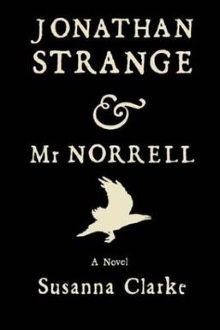
This is certainly a well-known novel, popular enough to merit its own television series adaptation. I still wouldn’t have read it if it weren’t for the recommendation in Jo Walton’s What Makes This Book So Great who is puzzled over why it hasn’t been more influential. I’d guess that most writers aren’t up to the task of emulating its unique writing style and are put off by the immense amount of research required to pull off something like this. The project seems to have taken a lot out of her as she has yet to produce its long awaited sequel.
In 1806 of an alternate history England, magic used to be common but is now only learned as a theoretical field. One man however, Gilbert Norrell, claims to be practical magician and proves it by making the statues of York Cathedral come to life. He moves to London in order to achieve his aim of reviving English magic and believes that he can do so by proving his usefulness to the government, especially in the war against the French. He is not taken seriously until he resurrects the fiancée of a Cabinet Minister, Emma Wintertowne. Meanwhile an encounter with a charlatan of a street magician Vinculus alters the life trajectory of another young gentleman, Jonathan Strange, who becomes a magician as well. To the surprise of all, Norell who is known for his jealousy and possessiveness of his collection of books of magic, takes a liking to Strange and becomes his mentor. In order to resurrect Emma, Norrell secretly summoned a powerful fairy who has actually placed her under a curse. This mysterious figure, known only as the gentleman with the thistle-down hair, becomes interested in Strange’s wife and Stephen Black, the butler of the minister Sir Walter Pole.
This is a very long novel and it incorporates a great many stories as the book is written as if it were a record of the events by an the author who lives in the fictional world, complete with footnotes and digressions. In fact, so much happens that it feels at times as if there were no main plot at all especially as there doesn’t seem to be much conflict in the novel, or at least serious ones. Due to the idiosyncrasies of the writing style, it took me a while to recognize that the gentleman with the thistle-down hair is indeed the antagonist and a dire threat. The magic depicted here is so powerful and so capable of seemingly any arbitrary feat that it’s difficult to think of the protagonists being in any real peril. Indeed the only limits that they have seem to be those that they impose on themselves by the rules of gentlemanly behavior. It can even feel frustrating at times when the text goes off on various tangents as if determined to drag things out for long as possible. Yet no matter where the story leads you, it never ceases to be entertaining and delightful.
The real draw of the novel is the antiquated language employed here and the wonderful world it conjures up. It’s not so much the magic as the attitude evinced here as Stephen Black behaves in a convivial manner with the gentleman with the thistle-down hair no matter what horrors the latter does, the way servants doggedly carry out the orders of their employers no matter how unreasonable they are and how the Duke of Wellington and his officers act like true gentlemen even in the middle of a battlefield. It’s a very particular caricature of Englishness that makes no real sense but is incredibly fun to read about. This is exaggerated even more by the author’s use of antiquated spelling for certain words. For example, it would be poor writing indeed if the author constantly repeats words, yet every time one of her characters is ‘surprized’ at something, I can’t help but be surprized myself. It’s infectious too. Read enough of this prose and you can barely refrain from thinking to yourself like this.
Still, there is only so far that one can take this stiff upper lip attitude. Stephen Black’s final confrontation for example is an unseemly break from his normal behavior while the author deftly avoids any ugly scene between Strange and Norrell, which somewhat stretches credibility given how much responsibility Norrell should bear for how things turned out. I’d also say that it gets tiresome at times once you realize that all of these digressions are the point but you’re impatient for the story to get back on track. I do love this novel however even if it isn’t the type of book that I usually read and it makes for an easy recommendation to just about anyone.